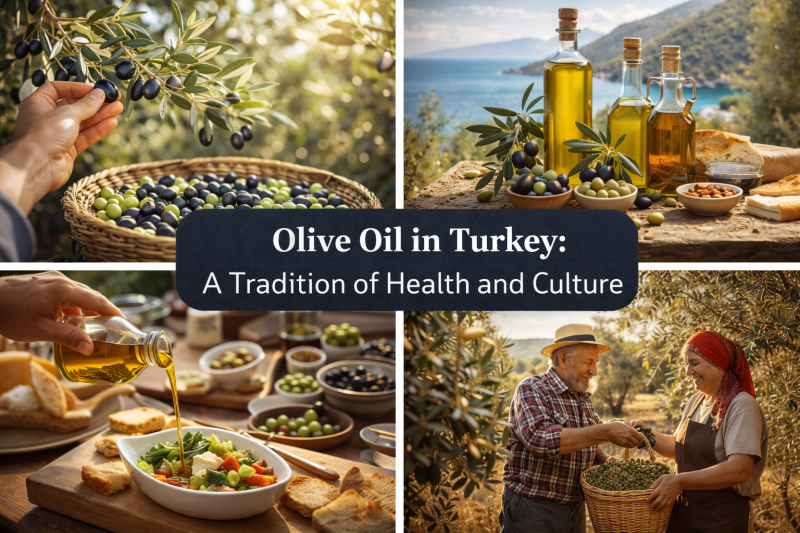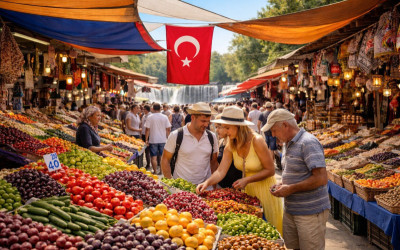Olive Oil in Turkey: A Cultural Treasure and Its Health Benefits
Turkey is one of the world's largest olive oil producers, with a long history of olive cultivation stretching back thousands of years. The Aegean and Mediterranean regions of the country, including popular holiday destinations like Bodrum, Marmaris, Fethiye, and Antalya, are home to countless olive groves and traditional olive oil mills. For the people of these regions, olive oil is not just a dietary staple but also a valuable economic asset and a symbol of cultural heritage.
Each year, thousands of tons of high-quality extra virgin olive oil are produced in Turkey, much of which is exported worldwide. However, beyond its economic importance, olive oil is increasingly recognized for its health benefits, particularly its potential role in cancer prevention. Thanks to its rich composition of oleic acid, polyphenols, and antioxidants, it has been linked to reduced risks of certain types of cancer, making it an essential part of a healthy lifestyle.
The Olive Oil Tradition in Turkey
In Turkey’s Mediterranean and Aegean regions, olive cultivation is deeply embedded in local traditions. Small villages near famous tourist resorts are surrounded by endless olive groves, where farmers and families have been growing olives for generations. During the harvest season, which typically begins in late autumn, farmers hand-pick their olives and take them to local olive oil mills to be pressed.
Unlike industrial production methods, these small mills use traditional cold-pressing techniques, ensuring that the oil retains its natural aroma, flavor, and nutritional properties. The process is a community effort, as families wait in line at the mills for their olives to be turned into pure extra virgin olive oil. This oil is then used in daily meals, preserved for future use, or sold at local markets.
Olive oil is also an important trade product, with many families producing small batches to sell directly to tourists and local businesses. Visitors to the Aegean and Mediterranean coasts often purchase locally produced olive oil as a souvenir, appreciating its pure quality and rich taste.
Olive Varieties in Turkey
Turkey is home to more than 90 different olive varieties, each with unique characteristics. These olives are categorized into table olives and oil olives, depending on their primary use.
Oil Olive Varieties (Used for Olive Oil Production)
- Memecik – Common in the Aegean region, known for its high oil content.
- Ayvalık (Edremit) – Preferred for high-quality extra virgin olive oil.
- Domat – Used for both table consumption and oil production.
- Uslu – Grown mainly in Manisa and surrounding areas.
- Çelebi – Found in Southeastern Anatolia, used for oil extraction.
Table Olive Varieties (Consumed as Green or Black Olives)
- Gemlik – The most well-known black table olive in Turkey.
- Domat – Large-sized, usually consumed as green olives.
- Çekişte – Big and firm green olives, grown in Aydın.
- Trilye (Tirilye) – Small-sized black olives, known for their rich taste.
- Eşek Zeytini – Extra-large olives, often stuffed or used in special dishes.
These olive varieties thrive in different regions of Turkey, with the Aegean, Marmara, Mediterranean, and Southeastern Anatolia being the primary olive-growing areas. The climate and soil conditions influence the flavor, texture, and oil content of each type.
Health Benefits of Olive Oil
Beyond its cultural and economic significance, olive oil is widely recognized for its numerous health benefits. The Mediterranean diet, which is rich in olive oil, has been associated with longer life expectancy and lower rates of chronic diseases. One of the most important areas of research regarding olive oil is its potential role in cancer prevention.
Olive Oil and Cancer Prevention
Studies suggest that regular consumption of extra virgin olive oil can help reduce the risk of various cancers due to its anti-inflammatory and antioxidant properties. Here’s how it may contribute to cancer prevention:
1. Breast Cancer
Breast cancer is one of the most common cancers worldwide. Research has shown that oleic acid, the primary fatty acid in olive oil, may inhibit the growth of breast cancer cells. Some studies suggest that oleic acid works by blocking cancer-promoting proteins, thereby slowing tumor development.
Additionally, the polyphenols in olive oil have been found to reduce oxidative stress and inflammation, two key factors that contribute to cancer progression. Women who follow a Mediterranean diet rich in olive oil have been found to have a lower risk of developing breast cancer.
2. Colon Cancer
Colon cancer is closely linked to diet and lifestyle choices. The polyphenols in olive oil help protect colon cells from damage, reducing the likelihood of cancerous mutations. These compounds also support gut health, promoting the growth of beneficial bacteria and reducing chronic inflammation in the digestive system.
Research has indicated that people who consume a high amount of olive oil as part of their daily diet have a significantly lower risk of colon cancer compared to those who consume less healthy fats.
3. Lung Cancer
Lung cancer remains one of the deadliest forms of cancer, and oxidative stress plays a major role in its development. Antioxidants in olive oil, particularly vitamin E and polyphenols, help neutralize harmful free radicals that can damage lung cells.
Studies have shown that people who consume olive oil regularly have a lower incidence of lung cancer, even among smokers. While olive oil cannot completely prevent lung cancer, it contributes to overall lung health and cell protection.
More Than Just a Food – A Way of Life
For the people of Turkey’s olive-growing regions, olive oil is more than just a cooking ingredient—it is a way of life. It is used in traditional dishes, natural remedies, skincare, and even religious ceremonies. Many Turkish families take great pride in their homemade olive oil, which they produce in small batches for personal use and sharing with friends and relatives.
How Olive Oil is Used in Daily Life
- Cooking: Olive oil is a key ingredient in Turkish cuisine, used in dishes like zeytinyağlı fasulye (olive oil green beans) and dolma (stuffed grape leaves).
- Skincare: Many locals use olive oil as a natural moisturizer and hair treatment.
- Traditional Medicine: Olive oil is often consumed on an empty stomach in the morning to aid digestion and improve overall health.
Beyond personal use, olive oil plays an essential role in local trade. Many Turkish farmers sell their olive oil to markets, restaurants, and international buyers, making it a major economic driver in the region.
Why You Should Include Olive Oil in Your Diet
While olive oil alone is not a miracle cure, it offers incredible health benefits when combined with a balanced diet and active lifestyle. Here are a few key reasons to make it a regular part of your diet:
- Rich in Healthy Fats: Unlike processed oils, extra virgin olive oil contains monounsaturated fats, which are good for heart health.
- Loaded with Antioxidants: Helps fight inflammation and supports cell health.
- Supports Brain Health: Studies suggest that olive oil may help reduce the risk of Alzheimer’s disease.
- Boosts Immunity: The polyphenols in olive oil help strengthen the immune system.
Incorporating high-quality Turkish olive oil into your daily meals is a simple and delicious way to support long-term health and wellness.
Comparison of Olive Oil Prices in Turkey and Europe
In 2025, olive oil prices in Turkey and Europe are shaped by different market dynamics. While prices in Turkey are rising, a decline is observed in Europe due to increased production and favorable weather conditions.
Olive Oil Prices in Turkey (2025)
- Edible olive oil price per kg: 275 TL (€7.53 / $8.05)
- Extra virgin olive oil price per liter: 295 TL (€8.08 / $8.64)
The main reasons for rising prices in Turkey:
✔ Increasing production costs and currency fluctuations
✔ Higher agricultural input costs (fuel, fertilizers, labor)
✔ Strong domestic demand and limited export regulations
Olive Oil Prices in Europe (2025)
Spain:
- Extra virgin olive oil price per liter: 155 TL (€4.25 / $4.55)
Portugal:
- In 2024, the price per liter was 317 TL (€8.67 / $9.30), but in 2025, it has dropped to 182 TL (€5.00 / $5.35).
Greece:
- In 2024, the price per liter was 295 TL (€8.10 / $8.70), but in 2025, it has fallen to 165 TL (€4.50 / $4.85).
Key reasons for the price decline in Europe:
✔ Higher production and favorable weather conditions in the 2025 season
✔ Increased supply due to rising olive oil production
✔ Export policies and global market balance adjustments
General Overview
As of 2025, olive oil prices in Turkey are nearly twice as high as in Europe.
Key factors behind this price disparity:
✔ Higher currency exchange rates and production costs in Turkey
✔ Increased olive oil production in Europe in the 2025 season
✔ Market supply-demand balance and local consumption policies
In the coming period, Turkey is unlikely to experience a similar price drop as Europe. However, exchange rate fluctuations, production costs, and export policies will continue to shape the future of olive oil prices in Turkey.
Conclusion
Turkey’s olive oil industry is not just about food production—it is a deeply rooted tradition that connects culture, health, and economy. From the olive groves of the Aegean and Mediterranean to the local mills where families press their olives, olive oil remains a precious and valuable resource.
Beyond its cultural significance, scientific research continues to highlight the health benefits of olive oil, particularly its role in cancer prevention. While it is not a magic cure, consuming extra virgin olive oil as part of a Mediterranean diet can help reduce the risk of breast, colon, and lung cancer while promoting overall health.
By choosing high-quality, cold-pressed olive oil, you are not only supporting your well-being but also contributing to the rich tradition of Turkish olive oil production. Whether you are enjoying a bowl of fresh Mediterranean salad, dipping bread in golden olive oil, or simply appreciating the centuries-old wisdom behind this ingredient, you are embracing a healthy and flavorful way of life.
An Unforgettable Journey Through Olive Groves!
Discover Turkey’s breathtaking landscapes and olive-covered hills with Vigo Tours’ nature and adventure tours. During the Jeep Safari tour, you will pass through scenic olive groves while exploring the stunning Mediterranean countryside.
Custom Olive Oil Tours with Vigo Tours!
Would you like to experience Turkey’s traditional olive oil production process, visit local producers, and taste the finest olive oils? Vigo Tours can arrange exclusive private tours, allowing you to explore olive farms and mills firsthand. For more information, contact us here.




